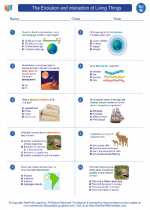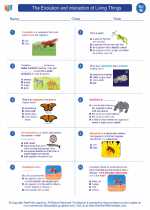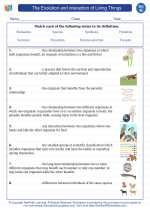Abiotic Factors
Abiotic factors are non-living components of an ecosystem that can influence the distribution, behavior, and abundance of living organisms. These factors can include physical and chemical characteristics of the environment, such as temperature, water, sunlight, soil, and air. Understanding abiotic factors is important in ecology as they play a crucial role in shaping the structure and function of ecosystems.
Key Abiotic Factors:
- Temperature: The average temperature of an environment can impact the types of organisms that can survive there. Extreme temperatures can be limiting factors for many species.
- Water: The availability of water is essential for the survival of living organisms. It can affect both terrestrial and aquatic ecosystems.
- Light: Sunlight is a key factor for photosynthetic organisms, influencing plant growth and the behavior of other organisms in the food chain.
- Soil: The composition and pH of soil can affect the types of plants that can grow in an area, which in turn influences the types of animals that inhabit the ecosystem.
- Air: The composition of gases in the air, such as oxygen, carbon dioxide, and nitrogen, can affect the respiration and metabolism of organisms.
Impact on Organisms:
Abiotic factors can directly and indirectly impact living organisms in various ways:
- Temperature fluctuations can affect the metabolic rate of organisms, their growth, and reproductive cycles.
- Water availability can determine the distribution of plants and animals and their ability to thrive in a particular environment.
- Light levels can influence the behavior of animals, as well as the productivity of plants through photosynthesis.
- Soil composition can affect the nutrient availability for plants and ultimately impact the entire food web.
- The composition of air can impact the respiratory systems of organisms and their ability to carry out metabolic processes.
Study Guide:
To understand abiotic factors in ecosystems, consider the following questions:
- How do temperature and precipitation patterns affect the distribution of plants and animals in different biomes?
- What are the adaptations that organisms have developed to survive in extreme environments with limited water or extreme temperatures?
- How does the availability of sunlight impact the structure and productivity of different ecosystems, such as forests, grasslands, and aquatic environments?
- What role does soil pH and nutrient content play in determining the types of vegetation in an area?
- How do human activities, such as pollution and deforestation, impact abiotic factors and the overall health of ecosystems?
By exploring these questions and studying the interactions between abiotic factors and living organisms, you can gain a deeper understanding of the complex dynamics within ecosystems.
.◂Science Worksheets and Study Guides Eighth Grade. The Evolution and interaction of Living Things

 Worksheet/Answer key
Worksheet/Answer key
 Worksheet/Answer key
Worksheet/Answer key
 Worksheet/Answer key
Worksheet/Answer key
 Vocabulary/Answer key
Vocabulary/Answer key
 Vocabulary/Answer key
Vocabulary/Answer key
